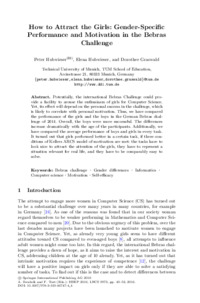How to Attract the GirlsGender-Specific Performance and Motivation in the Bebras Challenge
Zu finden in: Informatics in Schools: Improvement of Informatics Knowledge and Perception (Seite 40 bis 52), 2016
  |
 |
 Diese Seite wurde seit 3 Jahren inhaltlich nicht mehr aktualisiert.
Unter Umständen ist sie nicht mehr aktuell.
Diese Seite wurde seit 3 Jahren inhaltlich nicht mehr aktualisiert.
Unter Umständen ist sie nicht mehr aktuell.
 Zusammenfassungen
Zusammenfassungen
 Potentially, the international Bebras Challenge could provide a facility to arouse the enthusiasm of girls for Computer Science. Yet, its effect will depend on the personal success in the challenge, which is likely to correlate with personal motivation. Thus, we have compared the performance of the girls and the boys in the German Bebras challenge of 2014. Overall, the boys were more successful. The differences increase dramatically with the age of the participants. Additionally, we have compared the average performance of boys and girls in every task. It turned out that girls performed better in a certain task, if three conditions of Kellers ARCS model of motivation are met: the tasks have to look nice to attract the attention of the girls, they have to represent a situation relevant for real life, and they have to be comparably easy to solve.
Potentially, the international Bebras Challenge could provide a facility to arouse the enthusiasm of girls for Computer Science. Yet, its effect will depend on the personal success in the challenge, which is likely to correlate with personal motivation. Thus, we have compared the performance of the girls and the boys in the German Bebras challenge of 2014. Overall, the boys were more successful. The differences increase dramatically with the age of the participants. Additionally, we have compared the average performance of boys and girls in every task. It turned out that girls performed better in a certain task, if three conditions of Kellers ARCS model of motivation are met: the tasks have to look nice to attract the attention of the girls, they have to represent a situation relevant for real life, and they have to be comparably easy to solve. Dieses Kapitel erwähnt ...
Dieses Kapitel erwähnt ...
 Tagcloud
Tagcloud
 Zitationsgraph
Zitationsgraph
 Zitationsgraph (Beta-Test mit vis.js)
Zitationsgraph (Beta-Test mit vis.js)
 Zeitleiste
Zeitleiste
 8 Erwähnungen
8 Erwähnungen 
- Informatics in Schools: Fundamentals of Computer Science and Software Engineering (Sergei Pozdniakov, Valentina Dagienė) (2018)


- Piaget’s Cognitive Development in Bebras Tasks - A Descriptive Analysis by Age Groups (Christine Lutz, Marc Berges, Jonas Hafemann, Christoph Sticha)


- Gender Differences in Graph Tasks - Do They Exist in High School Bebras Categories Too? (Lucia Budinská, Karolína Mayerová, Michal Winczer)


- Differences Between 9–10 Years Old Pupils’ Results from Slovak and Czech Bebras Contest (Lucia Budinská, Karolína Mayerová, Václav Šimandl)


- Piaget’s Cognitive Development in Bebras Tasks - A Descriptive Analysis by Age Groups (Christine Lutz, Marc Berges, Jonas Hafemann, Christoph Sticha)
- WiPSCE '20 - Workshop in Primary and Secondary Computing Education, Virtual Event, Germany, October 28-30, 2020 (Torsten Brinda, Michal Armoni) (2020)
- Learning to program - the gap between school world and everyday world (Gert Braune, Andreas Mühling) (2020)


- Learning to program - the gap between school world and everyday world (Gert Braune, Andreas Mühling) (2020)
- Informatics in Schools: Engaging Learners in Computational Thinking - 13th International Conference, ISSEP 2020, Tallinn, Estonia, November 16-18, 2020 Proceedings (Külli Kori, Mart Laanpere) (2020)


- Participants’ Perception of Tasks in an Informatics Contest (Jiří Vaníček, Václav Šimandl)


- Participants’ Perception of Tasks in an Informatics Contest (Jiří Vaníček, Václav Šimandl)
- WiPSCE '21 - The 16th Workshop in Primary and Secondary Computing Education, Virtual Event / Erlangen, Germany, October 18-20, 2021 (Marc Berges, Andraes Mühling, Michal Armoni) (2021)
- Data-driven Analysis of Gender Differences and Similarities in Scratch Programs (Isabella Graßl, Katharina Geldreich, Gordon Fraser) (2021)


- Data-driven Analysis of Gender Differences and Similarities in Scratch Programs (Isabella Graßl, Katharina Geldreich, Gordon Fraser) (2021)
- Informatics in Schools. A Step Beyond Digital Education - 15th International Conference on Informatics in Schools: Situation, Evolution, and Perspectives, ISSEP 2022, Vienna, Austria, September 26–28, 2022 (Andreas Bollin, Gerald Futschek) (2022)


- Bebras Challenge in a Learning Analytics Enriched Environment - Hungarian and Indian Cases (Zsuzsa Pluhár, Heidi Kaarto, Marika Parviainen, Sonia Garcha, Vipul Shah)


- Bebras Challenge in a Learning Analytics Enriched Environment - Hungarian and Indian Cases (Zsuzsa Pluhár, Heidi Kaarto, Marika Parviainen, Sonia Garcha, Vipul Shah)
- WiPSCE '22 - The 17th Workshop in Primary and Secondary Computing Education, Morschach, Switzerland, 31 October 2022 - 2 November 2022 (Mareen Grillenberger, Marc Berges) (2022)

- 6. Gender-dependent Contribution, Code and Creativity in a Virtual Programming Course (Isabella Graßl, Gordon Fraser) (2022)


- 6. Gender-dependent Contribution, Code and Creativity in a Virtual Programming Course (Isabella Graßl, Gordon Fraser) (2022)
 Anderswo finden
Anderswo finden
 Volltext dieses Dokuments
Volltext dieses Dokuments
 |  How to Attract the Girls: Gender-Specific Performance and Motivation in the Bebras Challenge: Artikel als Volltext bei Springerlink ( How to Attract the Girls: Gender-Specific Performance and Motivation in the Bebras Challenge: Artikel als Volltext bei Springerlink ( : :  , 1273 kByte; , 1273 kByte;  : :  ) ) |
 Anderswo suchen
Anderswo suchen 
 Beat und dieses Kapitel
Beat und dieses Kapitel
Beat hat Dieses Kapitel während seiner Zeit am Institut für Medien und Schule (IMS) ins Biblionetz aufgenommen. Beat besitzt kein physisches, aber ein digitales Exemplar. Eine digitale Version ist auf dem Internet verfügbar (s.o.). Es gibt bisher nur wenige Objekte im Biblionetz, die dieses Werk zitieren.









 Motivation
Motivation




 Biblionetz-History
Biblionetz-History